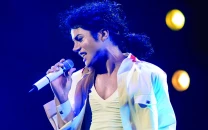Buzzkill: Not quite out of the shell yet…
‘Ghost in the Shell’ trailer leans towards whitewash controversy, upsetting fans further

Ghost in the Shell stars Scarlett Johansson as Major. PHOTO: FILE
If the vocal outcry over the whitewashing of Ghost in the Shell was heard by the film-makers responsible for the movie, their response — at least as far as can be seen from the first trailer — has been to double down on the coded imagery and damn the haters. But, according to The Hollywood Reporter, that’s just one of the problems Rupert Sanders’ adaptation of the beloved Japanese manga is facing.
For a movie criticised for its racial undertones, it’s actually somewhat surprising that the first image of the trailer is a robotic geisha. But the imagery of the entire opening sequence is filled with curious racial subtext. It is a white man confronted by the geisha robot (indeed, in the glimpse of men pulled from the table by the robots, it’s only white men being pulled away — saving them from an assault that seemingly slaughters those remaining at the table). Scarlet Johansson’s Major dives to their rescue, past a neon sign reading “High Quality” in Japanese. It just seems as though the trailer’s opening sequence has been created specifically to lean in to the existing whitewashing controversy.
In many ways, the opening sequence turns the other things in the trailer, which might otherwise seem innocuous, problematic. Johansson’s skintight outfit might be faithful to the original source material but it looks exploitative in real life, for one thing. Changing a character’s ethnicity is fine but why would anyone change the outfit and risk making angry fans even angrier? Also, an intimate scene shows Major in a romantic connection with someone but once again, seems to have been put in for the male gaze only, more than anything else.
These elements and instants that seem intended to provoke are what will stick in the viewers’ minds most after they watch the trailer, which otherwise offers a mix of existential philosophy and gunplay that feels familiar for anyone who’s seen The Matrix. Ironically, the original Ghost in the Shell manga predated the Wachowskis’ breakthrough by a decade and indeed, influenced its creation. Also, the cityscape feels as influenced by Ridley Scott’s Blade Runner and Terry Gilliam’s Brazil as anything more contemporary.
As a result, Ghost in the Shell is left feeling very ‘now,’ prodding subjects and obsessions of the contemporary audience without advancing the conversation. It seems to be using the imagery of the era today’s viewers are obsessed with… which happens to be thirty years ago. Shouldn’t science fiction be more forward-looking than that?
Published in The Express Tribune, November 16th, 2016.
Like Life & Style on Facebook, follow @ETLifeandStyle on Twitter for the latest in fashion, gossip and entertainment.



















COMMENTS
Comments are moderated and generally will be posted if they are on-topic and not abusive.
For more information, please see our Comments FAQ